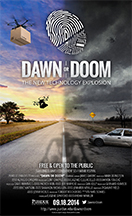Students trust technology, but have concerns about privacy and robotics, poll shows
September 17, 2014
 |
|
The upcoming "Dawn or Doom" conference will examine the role of several rapidly expanding technologies in society. The conference will be held Thursday (Sept. 18), and is free and open to the public. (Purdue University image) |
WEST LAFAYETTE, Ind. – Purdue University students are optimistic about how technology will improve their lives but have concerns about privacy and the role of specific technologies, according to a poll.
A survey of 750 Purdue students shows that although they think their lives will be better in the future thanks to new technologies, they have concerns about specific technologies, including Internet privacy, data collection by "The Internet of Things," and the potential for robots to cause unemployment.
The poll was taken in advance of the upcoming Purdue event, Dawn or Doom: The New Technology Explosion, which will explore the role of future tech in society. The event will be Thursday (Sept. 18) and is free and open to the public. Details of the event are available at http://www.purdue.edu/dawnordoom.
Gerry McCartney, Purdue's CIO, vice president for information technology, and Oesterle Professor of Information Technology, says the survey shows students are asking appropriate questions about technology.
"Sometimes we tend to think of college students as embracing any new form of technology, but the survey results tell me that our students are carefully distinguishing between different technologies and are considering potential consequences of widespread adoption of these tools," McCartney said.
Among the poll responses:
* Do you think technology makes your life significantly better or worse?
Significantly better: 66 percent
Slightly better: 31 percent
Slightly worse: 2 percent
Significantly worse: less than 0.1 percent
* Will robotics make your life significantly better or worse?
Significantly better: 29 percent
Slightly better: 52 percent
Slightly worse: 15 percent
Significantly worse: 4 percent
* Do you think in the future you will have more or less privacy online?
A lot more privacy: 8 percent
Slightly more privacy: 11 percent
Slightly less privacy: 27 percent
A lot less privacy: 54 percent
* Do you think in the future artificial intelligence (AI) will make your life better or worse?
Significantly better: 20 percent
Slightly better: 49 percent
Slightly worse: 21 percent
Significantly worse: 9 percent
* Do you think in the future nanotechnology will make your life better or worse?
Significantly better: 51 percent
Slightly better: 40 percent
Slightly worse: 7 percent
Significantly worse: 2 percent
* Do you think in the future genetic modification will make your life better or worse?
Significantly better: 25 percent
Slightly better: 43 percent
Slightly worse: 22 percent
Significantly worse: 9 percent
* People often have a great deal of affection for machines (such as a beloved car). Should machines have any moral standing?
Some machines have a special place in our lives and should have some level of moral standing: 33 percent
Machines are a collection of parts and should have no moral standing: 50 percent
I don't know: 17 percent
* Sports increasingly involve conflicts over technology, whether it's performance-enhancing drugs, speed-enhancing swimsuits, surgical enhancements, or even instant replay in baseball. What will be the outcome of techno-scientific advancements intertwined with sports?
It will bring about a dawn of more exciting and safer sport: 39 percent
It will be the doom of sports because people won't know what is due to human achievement and what is due to the technology : 40 percent
I don't know: 27 percent
* The "Internet of Things" is the term used to describe putting sensors and microprocessors into things we use every day. Already we have Internet-connected thermostats and refrigerators for our homes that gather data about our personal habits to deliver better service. What will be the result of the Internet of Things?
The Internet of Things will make our products smarter so they are able to anticipate our needs and bring about a dawn of greater convenience to our lives: 42 percent
The Internet of Things will bring about a doom of personal privacy and security as corporations gather data about us and sell it to other companies or government agencies: 45 percent
I don't know: 13 percent
* Robots enhanced with artificial intelligence are displaying great capability. Already there are robotic automobiles and robotic systems that write newspaper articles. What will be the effect of these robots?
They will bring about a dawn of productivity by freeing workers to focus on tasks that require creativity and personal interaction with customers: 34 percent
They will bring a doom to the employment market by displacing millions of workers: 52 percent
I don't know: 14 percent
* Will super-intelligent computers - hundreds of times more intelligent than humans, thanks to artificial intelligence - be an enormous benefit to society or a threat to our way of life?
Bring about a dawn of solutions to global problems: 43 percent
Bring about doom due to our inability to control them: 37 percent
I don't know: 20 percent
* Several fields of science and engineering, including synthetic biology, neuroengineering, computer science, and nanotechnology, are working toward the creation of new life forms of and modifications to life. Will this make your life better or worse?
Significantly better: 24 percent
Slightly better: 50 percent
Slightly worse: 19 percent
Significantly worse: 8 percent
Writer: Steve Tally, 765-494-9809, tally@purdue.edu, Twitter: sciencewriter
Source: Gerry McCartney, 765-496-2270, mccart@purdue.edu, Twitter: @gerrymccartney

